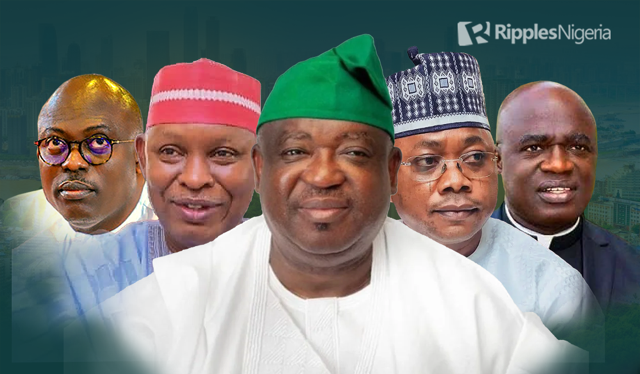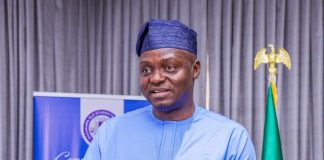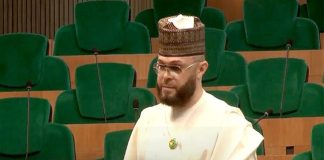🌿 Ruzu Non-Alcoholic Herbal Bitters
Ruzu Non-Alcoholic Herbal Bitters is a natural health supplement specially formulated to:
- ✅ Promote general wellness
- ✅ Detoxify the body
- ✅ Support the treatment of various ailments
Made from a powerful blend of 100% organic and medicinal herbs, Ruzu is completely alcohol-free, making it ideal for:
- 👪 All age groups
- 🌱 Health-conscious individuals
- 🌿 Anyone seeking non-alcoholic herbal remedies
Whether you're looking to boost your vitality, cleanse your system, or support healing the natural way, Ruzu Bitters offers a trusted herbal solution.
Our Model
Ranking Nigerian Governors is a special monthly publication of Ripples Nigeria geared towards reviewing the performance of Nigerian governors.
From inception in August 2019, we have taken more than a passing look at the policy statements, actions or inactions of state governors and their impact on citizens residents in their states, using a ranking system that groups them into Top 5 and Bottom 5. This we did consistently in the early days of the publication.
We, however, tweaked the ranking system with the decline in governance at all levels in the country. To bridge the gap, a new approach was adopted in assessing them. This approach focuses on identifying those worth mentioning either positively or negatively, while giving a verdict on the general state of governance by the governors.
Though we acknowledge that there are challenges associated with governance in this part of the world, especially the dwindling resources at the disposal of state governors and the ever-rising wage bills and other needs calling for attention, we believe that leaders who are smart and creative would not find it too difficult to make things work given the abundant natural and human resources available all over the country.
A Look Back
In the last publication, we beamed our searchlight on the transformative actions the Governor of Lagos State, Babajide Sanwo-Olu, had been taking in the area of mass transportation in the state through deployment of rail projects, two as at the last count, with more in the works, to ease communiting in the state. Asides this, the Sanwo-Olu administration set up discount markets where foodstuffs are sold to residents in different parts of the state, cushioning the impact of the biting inflation. This, we believe, should be a model for other state chief executives in the country.
Also in the last publication, we mentioned the humongous amount of money— over N28 billion naira— spent of Ramadan feeding by some states in the North, questioning the proprietary of what we see as an unnecessary jamboree, especially when viewed alongside the gapping needs of those states. It was our opinion that government is not expected to play the role of Father Christmas who doles out freebies, but should instead be an enabler of good life for the people through initiatives that enhance their well-being.
In Focus
In the current publication, which coincides with the first year anniversary of most first-term governors, we look at the performances of these governors and how they have advanced or compromised the cause of governance in their states.
We contend that most of these governors have had a rather bumpy time administering their states, grappling with one issue or the other, which we believe could have been avoided if tact, commonsense, and proactive measures were brought into governance.
We reckon that many Nigerians in virtually all the states in the country are at a loss, wondering if governance in the states is actually retrogressing or improving. Sadly, the verdict seems to be the former.
Rivers
In Rivers State where Governor Siminalayi Fubara holds sway, it has largely been ‘one day, one trouble!’
Faced with a formidable foe, Governor Fubara, though claims the contrary, has been bugged down by the crisis between him and his estranged godfather, the Minister of the FCT, Nyesom Wike, who has vowed to cut him to size and clip his growing wings.
Fubara’s tenure so far has been bumpy, crisis-ridden and controversial, with a pileup of illegalities daily taking place under his watch. We are of the opinion that if nothing urgent is done to find a lasting solution to the crisis, Fubara may spend a greater part of his four-year tenure fighting a familiar foe, massively distracted and unable to serve the people he was elected to serve.
Kano
The situation in Kano calls for grave concern as Governor Abba Yusuf, with the support of his godfather, Rabiu Kwankwaso, adopted a vindictive approach to governance from his first day in office.
READ ALSO:Ranking Nigerian Governors, March, 2024: As Sanwo-Olu raises the bar, ‘Ramadan Jamboree’ offers striking contrast in the North
Governor Yusuf’s approach to governance, which has largely pitched him against the state’s former governor, Abdulahi Ganduje, and lately, a section of the populace, has no doubt led to tension in a state known for its volatility.
Government, as they say, is a continuum, making it incumbent on successors to not only continue with policies of their predecessors, where beneficial, but also improve on them. It is, however, a different case for the Kano governor as he has taken every step to undo whatever Ganduje did while in office.
The current tensed atmosphere in the state is a testament to how wrongly things can go when tact and proactive reasoning and actions are thrown to the dustbin. The sacking of the five emirs appointed under the Ganduje administration and the scrapping of the four new Emirates in Kano, Gaya, Bichi and Karaye is no doubt a way of courting trouble in a sensitive and volatile state like Kano.
We do recognize however, that this was done the proper way by going through the state House of Assembly and enacting a law to back up the move, another action which raises grave concerns, seeing how easy it is for a governor to get the state assembly to bend to his whims and caprices.Being a democracy, this portends danger, as one man is bestowed with so much power, which in the Nigerian setting is usually abused by the governors!
Worse still, it is our belief that Governor Abba went too far when he ordered the arrest of now deposed Emir Aminu Ado Bayero for having the temerity to enter the state after being deposed. That singular action, to many, further raised tension in the state and only time will tell how far this will go.
Kogi State
Though Governor Usman Ododo is just few months old in office, he has incured the wrath of Nigerians for his lack of tact, poor thinking, and failure to be his own man.
We recall how the new Ododo administration in Kogi got on the wrong side of Nigerians when he reportedly created the Office of Former Governor to be domiciled at the Lugard House, Lokoja. Though his information commissioner, Kingsley Fanwo, denied it after the massive backlash from Nigerians, it was clear from then what direction the new administration was headed, with many believing that Ododo would only be a figurehead governor while his predecessor, Yahaya Bello, would continue to call the shots.
The fear of Kogites has become even more pronounced with the vehemence with which the state government under Ododo continues to defend Bello every time issues of corruption under Bello come to the fore. This absurdity, however, came to a head when Ododo smuggled Bello out of his Abuja residence to escape a siege laid on the building by operatives of the Economic and Financial Crimes Commission (EFCC).
We contend that Ododo’s action— aiding a suspect to escape lawful arrest in contravention of the laws of the country— is a criminal offence that should have landed him behind bars were it not for the unmerited immunity Nigerian governors enjoy!
We note that while Ododo was busy shielding— is still shielding— Bello from lawful arrest, the people of Kogi remain at the mercy of bandits, criminal herdsmen and kidnappers who have turned the state into another hotspot of insecurity. This was further amplified by the attack on the state’s Confluence University of Science and Technology, where scores of students were abducted.
It is our honest opinion that for the state to witness any meaningful development, and the lives and property of residents to be safe and secure, Ododo must divorce himself from his master, Yahaya Bello, and extricate himself from the undemocratic loyalty to him, and instead focus on his job as the chief executive officer of Kogi State, with his complete loyalty to the Nigerian Constitution and the people of the state.
Plateau State
Plateau State Governor, Caleb Mutfwang, cuts the picture of a pliant and easy-going personality, a disposition that may not be best suited for a volatile state like Plateau.
Since Governor Mutfwang took over as the helmsman of the state, Plateau has witnessed several bandit and suspected herdsmen attacks that have left several hundreds dead and thousands injured.
Though the bloodletting in the state predates the Mufwang administration, it is, however, not an excuse that insecurity has continued to be on the rise in the state with nothing tangible done to curb it.
We believe Governor Mutfwang has a duty to break from the past ways of addressing the insecurity problems on the Plateau by being more proactive in protecting the lives and property of residents of the state that have been at the receiving end of insecurity for far too long.
Benue State
Just like Governor Mutfwang, Benue State Governor, Hyacinth Alia, inherited what could be described as an intractable security challenge, with local militias and suspected herdsmen wreaking havoc on residents of the state.
The situation under Father Alia, a Catholic priest, has not changed from what transpired under Samuel Ortom, the immediate past governor of the state. Rather, it appears to be getting worse, no thanks to the simplistic approach Alia is employing.
Contrary to the hardline stance of Ortom, Governor Alia choose to be soft on the bloodthirsty criminals when his administration announced plans to engage the marauders with a view to having them cease hostilities. Just as we said in a previous publication of Ranking Nigerian Governors, this was bound to fail!
In yet another simplistic approach, Governor Alia signed an executive order banning holding of social events beyond 10pm anywhere in the state. The question we ask here is, do these criminals holding the state to ramsom do that at social functions? Do they attend funerals and naming or wedding ceremonies to carry out their dastardly acts? Is there a record of killer herdsmen that have been terrorising Benue communities being socially inclined?
It’s our sincere belief that if Benue will witness peace and tranquility under Alia, there is an urgent need for his administration to change its approach to the problem of insecurity.
Another sore point in Governor Alia’s one year in office is his inability to handle challenges with his party, the All Progressives Congress (APC) in the state. This has led to further tension in the state, especially with leaders of the party at the state level.
On the whole, the first year of first term governors has been a bumpy ride and largely disappointing.
If you like what we do, and are ready to uphold solutions journalism, kindly donate to the Ripples Nigeria cause.
















